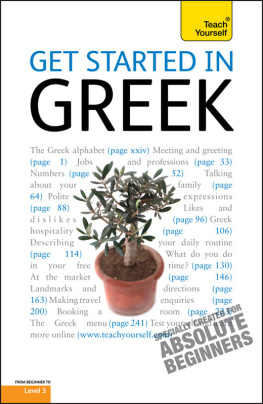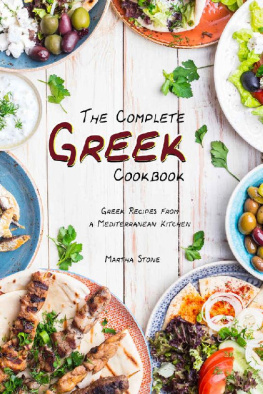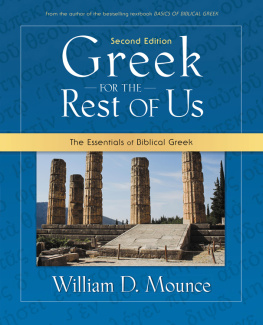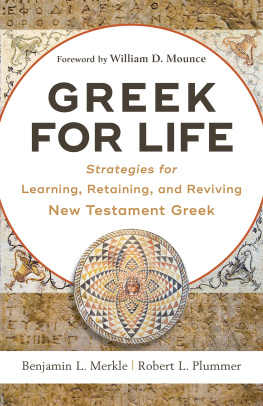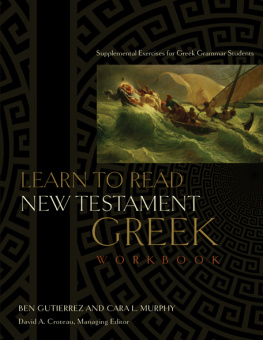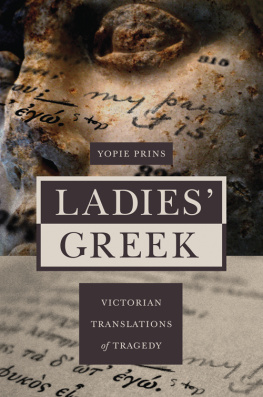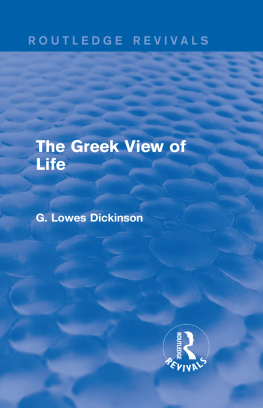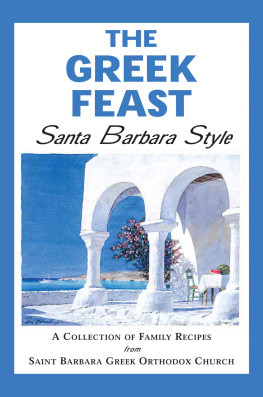Matsukas - Get Started in Greek
Here you can read online Matsukas - Get Started in Greek full text of the book (entire story) in english for free. Download pdf and epub, get meaning, cover and reviews about this ebook. year: 2012, publisher: John Murray Press, genre: Children. Description of the work, (preface) as well as reviews are available. Best literature library LitArk.com created for fans of good reading and offers a wide selection of genres:
Romance novel
Science fiction
Adventure
Detective
Science
History
Home and family
Prose
Art
Politics
Computer
Non-fiction
Religion
Business
Children
Humor
Choose a favorite category and find really read worthwhile books. Enjoy immersion in the world of imagination, feel the emotions of the characters or learn something new for yourself, make an fascinating discovery.
- Book:Get Started in Greek
- Author:
- Publisher:John Murray Press
- Genre:
- Year:2012
- Rating:5 / 5
- Favourites:Add to favourites
- Your mark:
- 100
- 1
- 2
- 3
- 4
- 5
Get Started in Greek: summary, description and annotation
We offer to read an annotation, description, summary or preface (depends on what the author of the book "Get Started in Greek" wrote himself). If you haven't found the necessary information about the book — write in the comments, we will try to find it.
Get Started in Greek — read online for free the complete book (whole text) full work
Below is the text of the book, divided by pages. System saving the place of the last page read, allows you to conveniently read the book "Get Started in Greek" online for free, without having to search again every time where you left off. Put a bookmark, and you can go to the page where you finished reading at any time.
Font size:
Interval:
Bookmark:

Saying hello and goodbye, exchanging greetings, asking and saying how people are, introducing yourself and your family, addressing people when you meet them
Asking about what languages people speak, saying what languages you speak, asking and saying where people come from, some cities and countries
Asking about different jobs and professions, answering a question about your job, describing the place where you live, different professions
Talking about your home, counting from 1 to 10, singular and plural nouns
Asking questions about family and children, describing your family, asking questions about peoples age, counting from 11 to 20
Welcoming people, replying to welcoming remarks, asking for or offering refreshments, counting from 21 to 100
Agreeing or disagreeing with someone, saying if you like or dislike something, more singular and plural nouns, starting to use adjectives, colours
Talking about daily routines, telling the time, counting from 101 to 1,000, adverbs
Talking about your free time, asking others if they have hobbies, different kinds of Greek music and films
Shopping in a fruit and vegetable market, asking other people to join you, describing different moods, counting from 1,000 to 10,000
Understanding and asking for directions, talking about distances, describing the location of a landmark, recognizing the names of places, making a bank transaction
Describing in more detail what you want to buy, asking about prices and sizes, saying more colours, reading common signs and public notices, more about word order
Making travel enquiries, finding out about public transport, making travel arrangements, the days of the week, types of transport, saying the twelve months and four seasons
Enquiring about rooms, making hotel reservations, talking about hotel facilities, hotel signs and notices
Coping with a Greek menu, ordering starters, main dishes and desserts, ordering drinks, understanding a waiters basic phrases, words related to Greek food

Several people have contributed directly or indirectly to the writing of this book. Special thanks go to: Sue Hart, Rebecca Green and Ginny Catmur, my editors at Hodder & Stoughton; my colleagues Sonia Krantonelli, Daniel Gorney and Christine Easthope at the British Hellenic College for comments, corrections, and encouragement; one of my most unique students Karl Kirchner for questioning and discussing everything with me; my daughter Arianna for giving me inspiration and my wife Joanna for putting this inspiration in perspective. (1st edition, 2001)
I would like to thank my students who over the years showed me what is important for them to learn and not what is important for me to teach! Through them I also realised that teaching is part of learning and learning part of teaching. It just needs open minds! (3rd edition, 2010)

I have worked as a professional author and language teacher for over 25 years. I have written language books with special focus on Greek as a foreign language, including a bilingual EnglishGreek, GreekEnglish pocket dictionary. I have lived about half of my life away from Athens, my birthplace, first in the US for fourteen years, where I had studied Teaching English as a Foreign Language (TEFL) and Applied Linguistics, and now in Berlin for the last nine years.
My accumulated teaching experience of Modern Greek comes from teaching adults and college students in New York City, then Athens, and more recently Berlin. My professional experience also includes among others university teaching in the USA, working as a head of department in a community college in Athens, as a language school director in Ioannina (Greece), and as the translator of three cookery books.
When not at my desk, I can usually be found in the kitchen, in a bookshop, or at a language book fair. I love travelling (having visited more than twenty countries), watching TV, and learning languages.
Aristarhos Matsukas
According to Aristides Konstantinides book Greek Words in the English Language there are 45,729 Greek words in English!
As you work through this course, you will become increasingly aware of Greek loanwords in English although sometimes, you have to stretch your imagination and bend the odd pronunciation rule to spot them. Here are some first examples of loan words: problem, music, politics, idea, programme, system. Have a go at the similar or different exercises in the Practice section of each unit. There are at least ten words in these exercises throughout this book that test your ability to make associations between what you already know and what you are learning. These associations can sometimes be difficult to detect: for example the words (myth), (metre) and (period) are easily detected once you know the Greek alphabet, but the word (book) does not carry an immediate association, although bibliography does.
You might be relieved to know that there are a large number of English loanwords in Greek too, for example complex, stress and camping. Many sports are also identical in both languages, for instance tennis and volleyball. New technology has also introduced many terms in Greek: computer, fax, and email are a few examples. In Greece many signs are in English, including the street sign for stop, the sign WC for public toilets, and even P for car parks. Sometimes, there is a Greek word for these words, but the English word is generally used in everyday language.
Greek is one of the Indo-European languages, with more than 4,000 years of development and history. It is spoken by more than 10 million people in Greece alone and about 4 million people elsewhere. Australia, Canada, the USA, and South Africa still have the largest Greek-speaking populations outside Greece. Apart from the second- or third-generation Greeks abroad, many foreigners, like perhaps yourself, learn Greek in colleges, adult education centres, or private language schools every single year. One of the reasons is perhaps to keep up ties with families, or new relatives, or even business colleagues in Greece. No matter what your reason is for actually wanting to learn Greek, you are about to study a very interesting language, rooted in a deep and rich cultural heritage, and spoken by a very proud nation.
After so many centuries, past works in this language are still relevant in many disciplines including philosophy, drama, the arts, and architecture, just to name a few. New doctors still take the Hippocratic Oath before graduation. Theologians and ordinands still read the New Testament in its original language, and mathematicians still try to expand on Pythagoras theorem after 2,500 years! The rich cultural and linguistic past of the Greeks should not be viewed as an extra burden on your efforts to learn Modern Greek as it is nowadays spoken in Greece. On the contrary, that past should make you aware that learning Greek today can set you apart from other bilinguals or multilinguals who claim knowledge of other major languages. It is not only an advantage to be able to speak Greek; it should also be a privilege and a unique experience! Even in the business world, knowledge of less commonly spoken languages can make a difference when you apply for a new job, so take this as a rewarding experience right from the start and remember you are not the first person to try and learn Greek. Many other language learners have succeeded in the past with this beautiful language and now you will be the next one.
Font size:
Interval:
Bookmark:
Similar books «Get Started in Greek»
Look at similar books to Get Started in Greek. We have selected literature similar in name and meaning in the hope of providing readers with more options to find new, interesting, not yet read works.
Discussion, reviews of the book Get Started in Greek and just readers' own opinions. Leave your comments, write what you think about the work, its meaning or the main characters. Specify what exactly you liked and what you didn't like, and why you think so.

